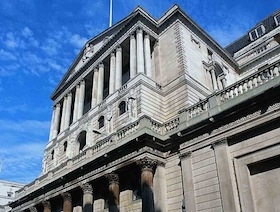The Bank of England has left its Bank Rate unchanged at half a per cent and the size of the Asset Purchase Programme at £375 billion - extending the record period of stability for another month.
There has been no change in the rate for over six years, with the committe voting to freeze it again today although one MPC member, Ian McCafferty, voted for an increase.
The previous change in Bank Rate was a reduction of 0.5 percentage points to 0.5% on 5 March 2009. A programme of asset purchases financed by the issuance of central bank reserves was initiated on 5 March 2009.
The previous change in the size of that programme was an increase of £50 billion to a total of £375 billion on 5 July 2012.
{desktop}{/desktop}{mobile}{/mobile}
In a statement the Bank said today: "The Bank of England’s Monetary Policy Committee (MPC) sets monetary policy in order to meet the 2% inflation target and in a way that helps to sustain growth and employment. At its meeting ending on 5 August 2015, the MPC voted by a majority of 8-1 to maintain Bank Rate at 0.5%. The Committee voted unanimously to maintain the stock of purchased assets financed by the issuance of central bank reserves at £375 billion, and so to reinvest the £16.9 billion of cash flows associated with the redemption of the September 2015 gilt held in the Asset Purchase Facility.
"With some underutilised resources remaining in the economy and with inflation below the target, the Committee intends to set monetary policy in order to ensure that growth is sufficient to absorb the remaining economic slack so as to return inflation to the target within two years. Conditional upon Bank Rate following the gently rising path implied by market yields, the Committee judges that this is likely to be achieved.
"In its latest economic projections, the Committee projects UK-weighted world demand to expand at a moderate pace. Growth in advanced economies is expected to be a touch faster, and growth in emerging economies a little slower, than in the past few years. The support to UK exports from steady global demand growth is expected to be counterbalanced, however, by the effect of the past appreciation of sterling. Risks to global growth are judged to be skewed moderately to the downside reflecting, for example, risks to activity in the euro area and China."
The bank said: "Private domestic demand growth in the United Kingdom is expected to remain robust. Household spending has been supported by the boost to real incomes from lower food and energy prices. Wage growth has picked up as the labour market has tightened and productivity has strengthened. Business and consumer confidence remain high, while credit conditions have continued to improve, with historically low mortgage rates providing support to activity in the housing market. Business investment has made a substantial contribution to growth in recent years."
Recent speculation from experts has suggested the US might raise its rates in the Autumn which could lead to the bank to increase rates in the UK.

